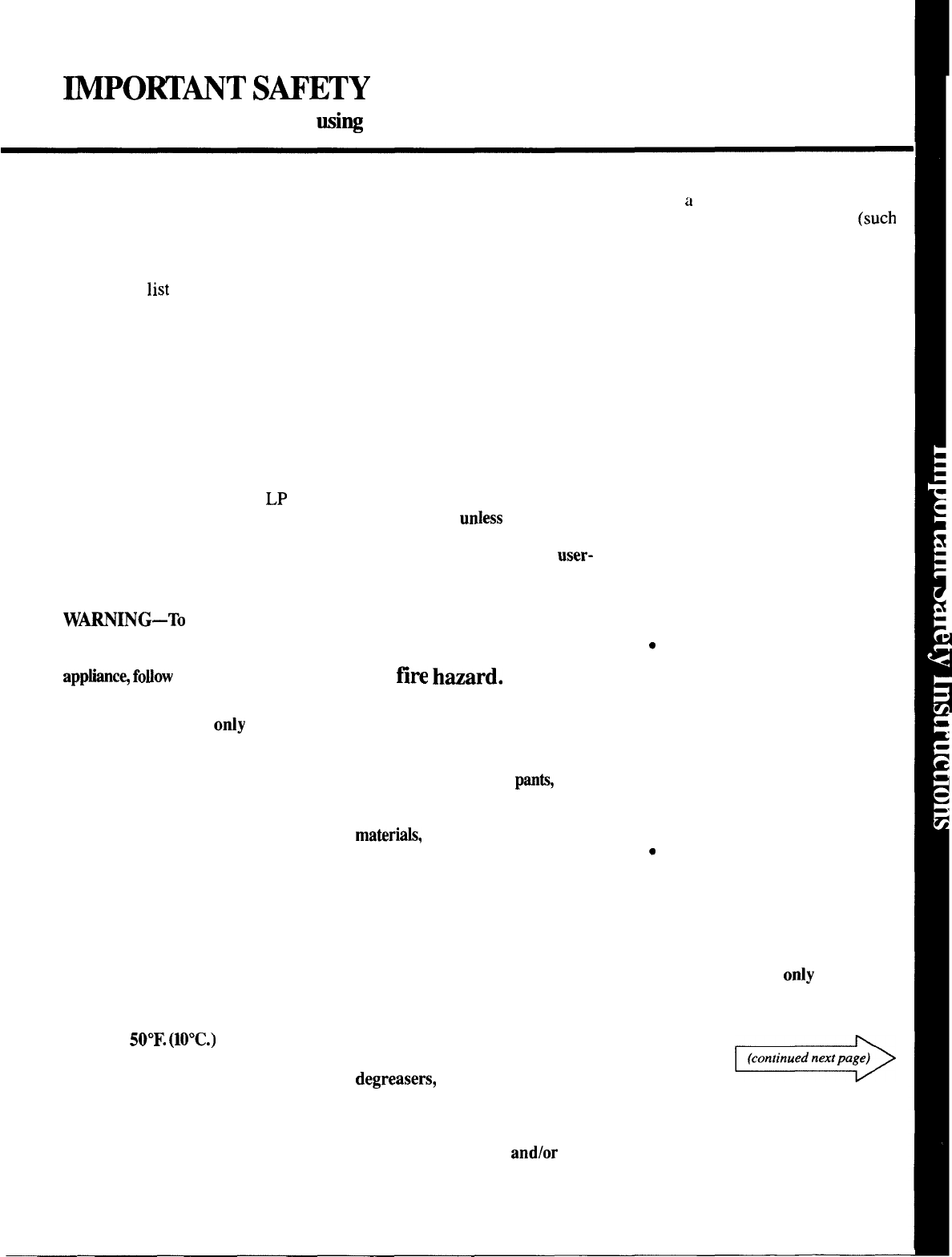
WO~~T
S~ETY
INSTRUCTIONS
Read all instructions before
usi~
this appliance.
IMPORTANT
SAFETY NOTICE
The California Safe Drinking
Water and Toxic Enforcement Act
requires the Governor of California
to publish a
list
of substances
known to the state to cause cancer,
birth defects or other reproductive
harm and requires businesses to
warn customers of potential
exposure to such substances.
Gas appliances can cause minor
exposure to four of these substances,
namely benzene, carbon monoxide,
formaldehyde and soot, caused
primarily by the incomplete
combustion of natural gas or
LP
fuels. Properly adjusted dryers will
minimize incomplete combustion.
Exposure to these substances can
be minimized further by properly
venting the dryers to the outdoors.
—
WA~ING—To
reduce the risk
of fire, electric shock, or injury
to persons when using your
app~ance,
fo~ow
basic precautions,
including the following:
. Use this appliance
only
for its
intended purpose
as described in
this Use and Care Book.
●
This dryer must be properly
installed and located in
accordance with the Installation
Instructions before it is used.
If
you did not receive an Installation
Instructions sheet with your dryer,
you can obtain one by contacting
the service location nearest you.
—Properly ground to conform
with all governing codes and
ordinances. Follow details in
Installation Instructions.
—Locate where the temperature
is above
50°F.
(lO°C.)
for
satisfactory operation of the
dryer control system. Do not
install or store the dryer where it
will be exposed to the weather.
–Connect to a properly rated,
protected and sized power-supply
circuit to avoid electrical overload.
—Exhausting to the outside is
STRONGLY RECOMMENDED
to prevent large amounts of
moisture and lint from being blown
into the room. Carefully follow the
Exhausting Details in the Instigation
Instructions.
●
When disconnecting this
appliance pull by the plug rather
than the cord to avoid damage to
the cord or junction of cord and
plug. Make sure that the cord is
located so that it will not be stepped
on, tripped over or otherwise
subjected to damage or stress.
●
Do not repair or replace any
part of the appliance or attempt
any servicing
unless
specifically
recommended in this Use and
Care Book or in published
user-
repair instructions that you
understand and have the skills to
carry out.
To minimize the possibility
of a
fire
hward.
●
Do not use heat to dry articles
containing rubber, plastic, or
similar materials (such as padded
bras, tennis shoes, galoshes, bath
mats, rugs, bibs, baby
Pts,
plastic
bags, etc.) as these materials may
melt or burn. Also, some rubber
materi~, when heated, can under
certain circumstances produce
fire by spontaneous combustion.
. Garments labeled “Dry Away
From Heat” (such as life jackets
containing Kapok) must not be put
in your dryer.
●
Do not wash or dry articles
that have been cleaned in, washed
in, soaked in, or spotted with
combustible or explosive substances
(such as wax, paint, gasoline,
degreasers,
dry-cleaning
solvents, kerosene, etc.) which
may ignite or explode. Do not use
or store such substances on/or
around your washer
andlor
dryer
during operation.
●
Any article on which you have
used
a
cleaning solvent, or which
contains flammable materials
(such
as cleaning cloths, mops,
towels used in beauty salons,
restaurants or barber shops, etc.)
must not be placed in or near the
dryer until all traces of these
flammable liquids or solids and
their fumes have been removed.
There are many highly flammable
items used in homes such as:
acetone, denatured alcohol,
gasoline, kerosene, some
household cleaners, some spot
removers, turpentines, waxes, wax
removers and products containing
petroleum distillates.
●
Clean the lint filter before each
load to prevent lint accumulation
inside the dryer or in the room.
DO NOT OPERATE THE
DRYER WITHOUT THE LINT
FILTER IN PLACE.
Q
Keep area around and
underneath your appliance free
from the accumulation of
combustible materials, such as
lint, paper, rags, chemicals, etc.
●
Do not store items that may burn
or melt (such as clothing, paper
material, plastics or plastic
containers, etc. ) on top of the dryer
during operation.
Q
The interior of the machine
and the exhaust duct connection
inside the dryer should be
cleaned periodically by a
qualified individual.
●
Exhaust duct (see installation
instructions). Use
only
metal
duct inside dryer or for
exhausting dryer to the outside.
3


















